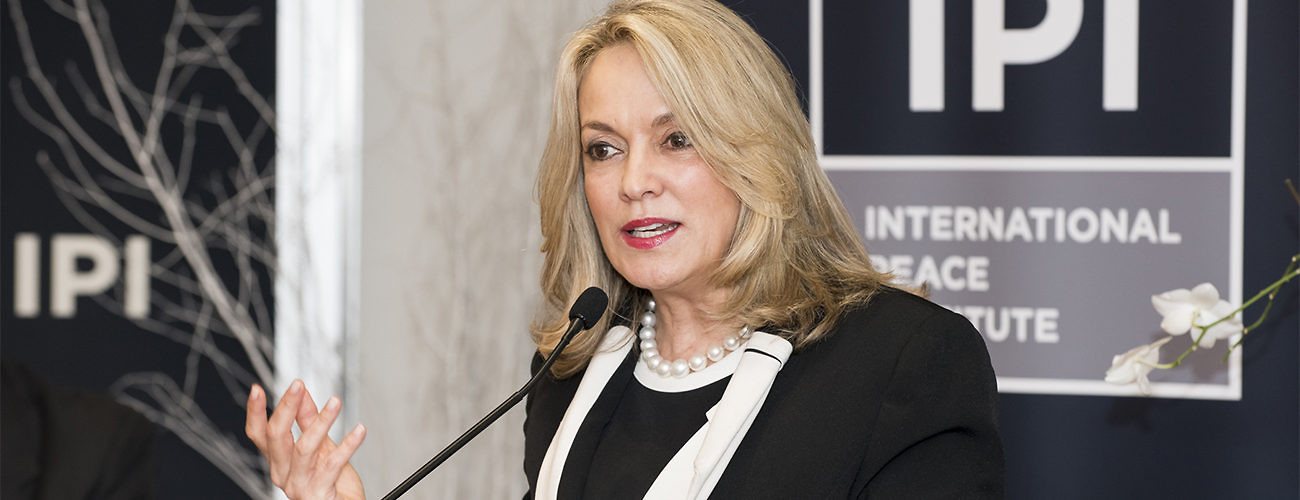“It hasn’t been easy, the country is polarized, but how good to live with the lessons learned,” said María Emma Mejia Vélez, Colombia’s Permanent Representative to the United Nations.
Painting last year’s Colombian-FARC accord as a blueprint for other countries in conflict, she said, “Even for African countries, we have something there that can be continued, and I urge IPI to continue. We need these analyses of the process while we turn to implementation. It’s the only way we learn.”
Ambassador Mejia gave opening remarks at the February 28, 2017 launch, co-sponsored by IPI and the Permanent Mission of Germany, of an IPI report entitled “Made in Havana: How Colombia and the FARC Agreed to End the War.”
The report was co-authored by Renata Segura, Associate Director at the Conflict Prevention and Peace Forum, and Delphine Mechoulan, Policy Analyst at IPI’s Brian Urquhart Center for Peace Operations. It detailed the process by which Colombia’s largest guerrilla group, the Fuerzas Revolucionarias de Colombia-Ejército del Pueblo (FARC-EP) signed a final peace agreement with the Colombian government on November 24, 2016, after more than half a century of conflict. It tries to explain why this peace process, the fourth of its kind, was successful in convincing the FARC to voluntarily lay down its weapons and start the transition to a political party.
Dr. Segura highlighted two of the three key elements that were central to the process. First, it was crucial that the negotiation agenda was concise and limited to six issues, a lesson from previous peace processes. Colombian President Juan Manuel Santos managed to reach a compromise between the core issues that interested the government—an end to the conflict and disarmament—and the twelve points of the FARC-EP’s agenda. Second, she explained the benefits and limits of removing the talks from Colombia to the more isolated setting of Havana, Cuba.
The choice of having the talks in Cuba had a clear impact on the participatory nature of the process. Dr. Segura stressed that this was one of the most divisive questions, and that almost all of the international actors and government civil servants interviewed for this paper argued that it was “perhaps the most participatory process ever in history” and even that it had “exhausted the possibilities of participation,” but most Colombian analysts argued the efforts were merely symbolic posturing that only mobilized those who already agreed with the process.
Ms. Mechoulan expanded on the final element, the role of the international community, detailing the latter’s central, but limited, role in the process. She explained that the government had involved the international community as part of an “à la carte” approach, requesting specific and limited roles while retaining control over the process at all times. Ms. Mechoulan highlighted in particular the crucial role of Cuba and Norway as guarantor countries, as well as the UN’s growing involvement, first through the country team, then in providing disarmament and reintegration expertise in the technical sub-commission on the end of conflict, and finally with the UN special political mission.
However, Ms. Mechoulan warned that “While the role of the many external actors was essential to the outcome of the negotiations, this support did not translate into wider legitimacy inside Colombia.” She said that “successful implementation” would be the best way to strengthen popular support.
Ms. Mechoulan also outlined the precarious situation surrounding the talks, referring to the decision to continue the negotiations even as the conflict took place. “In Havana, negotiators talked as if war wasn’t there; in Colombia, generals made decisions as if talks in Havana were not there,” she explained.
Teresa Whitfield, Officer-in-Charge of the UN’s Department of Political Affairs’ Policy and Mediation Division, expanded on Ms. Mechoulan’s diagnosis, saying, “The decision for an armed group such as FARC, which was isolated from the world for its entire life, to move away from armed conflict is an existential step for which FARC deserves a lot of credit.”
Ms. Whitfield also cast credit on the UN, which she praised for emerging in a strong role, meeting the task of coordinating the victims of the conflict, and persisting in “the long, slow process of very collaborative conversations and the flexibility to come up with a very unique structure tailored to what Colombia needed.”
Daniel García-Peña, a professor at the University of Bogotá, agreed with this assessment, and added that it was significant that both the Colombian government and the FARC rebels saw themselves as “losers” of previous, failed peace talks. For the first time, both parties acknowledged that the dispute would not be solved militarily, and understood that a solution could be achieved only through dialogue.
The professor further noted that the success of the peace talks also owed to the inclusion of Colombia’s military for the first time.
Mr. García-Peña, warning that the hard-won peace could be undone, evoked the looming spectre of former President Álvaro Uribe, who was a leading voice in opposition to the peace process. Mr. García-Peña stated his belief that if Mr. Uribe were to run for the presidency in 2018 and win, he could represent a threat to Colombia’s new peace, and the responsibility would fall on the shoulders of the international community to safeguard the agreement.
“The real test is in 2018,” he warned. “This is not a done deal. I will simply end by saying that the international community cannot simply say, ‘This is done, we can go home.’ The international community has a huge role to play, to keep their eyes open.”








